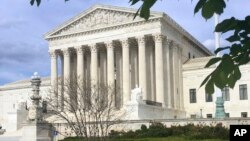Nyet. Non. Nein. No. That's the answer the Supreme Court gave Thursday to the question of whether federal courts in the United States must accept statements from foreign governments about their own laws as binding.
Justice Ruth Bader Ginsburg wrote for a unanimous court that a “federal court should accord respectful consideration to a foreign government's submission,” but is not required to treat it as conclusive.
Given “the world's many and diverse legal systems and the range of circumstances in which a foreign government's views may be presented,” there is no single formula on how to treat the information a foreign government provides, Ginsburg wrote.
Ginsburg said the appropriate weight given to a government's statement in each case will depend on the circumstances. Among the factors that U.S. courts should weigh in looking at what a foreign government has said about its own law are: the statement's clarity, thoroughness and support as well as the transparency of the foreign legal system and the role and authority of the statement's author.
Trade case
The ruling came in a case that involves trade with China, a class action lawsuit filed by two U.S.-based purchasers of vitamin C: Nacogdoches, Texas-based Animal Science Products and Elizabeth, New Jersey-based The Ranis Company. The companies sued vitamin C exporters in China. They alleged the exporters had violated U.S. antitrust laws by fixing the prices and amounts of vitamin C exported to the United States.
The vitamin C exporters argued that Chinese law had required their actions and that the lawsuit should therefore be dismissed. China's Ministry of Commerce filed a brief arguing the same.
US rulings
A federal trial court said the ministry was entitled to “substantial deference” in its interpretation of its own law but didn't find its statements conclusive. The judge ruled that Chinese law did not require the companies to fix the price or quantity of vitamin C exports, and after a jury found against the exporters, the judge awarded the U.S. companies $147 million.
The New York-based U.S. Court of Appeals for the 2nd Circuit reversed the award and dismissed the lawsuit, saying when a foreign government participates in U.S. court proceeding and submits a statement about its laws and regulations the U.S. court is “bound to defer to those statements.” The Supreme Court disagreed.
The Trump administration had urged the court to side, as it did, with the Vitamin C purchasers.
The case is 16-1220, Animal Science Products v. Hebei Welcome Pharmaceutical Co.





